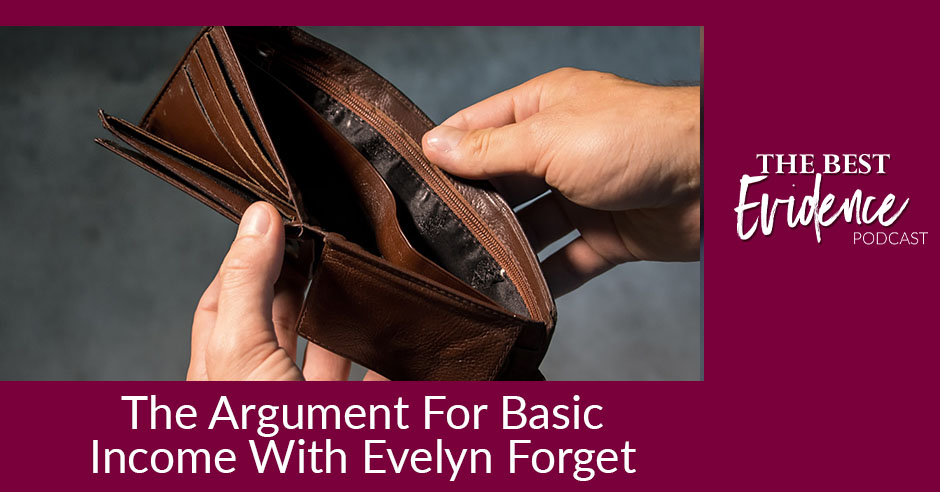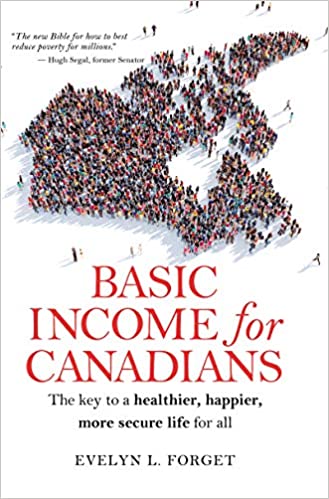
Canada had a basic income pilot before Ontario. Evelyn Forget’s research on the 1970s Mincome basic income experiment in Manitoba showed that hospital admissions declined and children were more likely to finish high school. Her latest work explores the lives of people who access government supports and frontline service providers. Evelyn is a professor and health economist at the University of Manitoba and the author of the book Basic Income for Canadians. Evelyn joins Cynthia Belaskie and Robbie Brydon to talk more about her research into basic income in Canada, the evidence and the principles behind decision making on income security policy.
—
Listen to the podcast here:
The Argument For Basic Income With Evelyn Forget
Hi Cynthia, what are we talking about?
The last time, you talked to Lindsay Tedds without me.
It’s true. I left you out. I’m sorry.
It’s alright. I forgive you.
We were talking about some of the challenges of implementing a basic income to trade-offs, what you could do on a lower budget and the benefits of income transfers. If you missed it, it’s well worth your time. Go back and read it, but you don’t need to read that one to enjoy this episode.
We’re going to get to the other side of the basic income debate with Evelyn Forget. She’s out of the University of Manitoba, where she’s an Economist and Professor in the Department of Community Health Sciences. She’s also Academic Director of the Manitoba Research Data Centre. She analyzed the results of the 1970s Mincome experiment, which was a basic income project in Manitoba. She’s got a book called Radical Trust.
When I was a kid, I thought it would be cool to be a sports broadcaster and interview the stars I looked up to. Now, I get to interview the stars I look up to but it’s not Doug Gilmour and Robbie Alomar. It’s Lindsay Tedds and Evelyn Forget. I am so excited.
You’re such a nerd.
—
Evelyn Forget, welcome to the program.
I’m delighted to be here.
You’ve done a lot of work on basic income over the last fifteen years or so and you’ve got a project where you’re interviewing a number of people. Can you tell us a little bit about that project?
I have a book coming out called Radical Trust: Basic Income for Complicated Lives. I approached basic income primarily because of my interest in the social determinants of health and I’m an economist. So I tended, in the past, to look at this from an economistic point of view: “Is this something we can afford? Is this feasible? Is it a better way of delivering social programs?” I’ve come to understand that there is a dearth of understanding in the broader population about the need for basic income and how it affects the lives of the most vulnerable people in society.
For the past year and a half, we’ve been interviewing all kinds of people: people who rely on a variety of government support because they’re going through transitions in their lives and frontline service providers. We walked with the Bear Clan in Winnipeg, an Indigenous-led organization that keeps the streets safe at night and connects people to services. We talked with kids aging out of the foster care system. We talked with previously incarcerated people who were rebuilding their lives. People who used substances and continue to use substances. We talked to people leaving violent relationships.
We tried to come to a better understanding of how our social programs fit into their lives, how they’re well-served by these programs and what some of the gaps are, and in some cases, how they felt about the concept of basic income. Most of them are supporters of basic income, and some are not. Some never thought about the idea until we raised it. We were talking to people trying to find out more about how people’s lives unfold.
What was your broad set of takeaways from those sets of interviews?
What we learned from this project is how complicated and how fluid people’s lives are. We have a better understanding of how people see themselves fitting into society. We have a better understanding of what reciprocity means within society, how people relate to one another. We came away with a better understanding of the breadth of values that people bring to ideas of social support, income supports and public services.
I’m looking forward to reading that.
It’s been great fun. We started with this notion of having nice tight little chapters, so we thought we’d do a chapter on kids aging out of care, another chapter on people who use substances and another chapter on formerly incarcerated people. We started talking to people. What we already knew became apparent, and that is that the foster care system is a pipeline into prisons. Probably the most vulnerable people in society are middle-aged women who have just been released from prison. They’re incredibly vulnerable because they’ve never lived on their own, they’ve never had an opportunity to learn how to put up barriers and protect themselves from people who would take advantage of them.
We learned so much about people’s lives. We met an incredibly supportive and incredibly interesting group of people who were prepared to help us understand better. I think my co-author and I are unabashedly members of the dominant culture in Canada. We’ve lived rather privileged lives and what we know, we know academically. It’s one thing to participate in town halls and workshops where people share their stories. It’s another thing to be invited into people’s lives. We met such an incredibly generous group of people. It’s been great fun.

You touched on a lot of the principles there that the BC Basic Income Expert Panel talks about in their report. We’ll get to that a little bit later, but before we do, I wanted to dive a little bit into the evidence base. I first heard you present your study of the Mincome experiment more than a decade ago. It starts to feel like old hat to me, but it may not be to everyone reading this. A quick recap is there was a guaranteed income experiment in Manitoba in the 1970s. There were sites in Winnipeg and Dauphin. You focused on the Dauphin site because of the ability to work with that data. People were guaranteed 60% of the low-income cutoff (LICO) and there was a 50% benefit reduction rate for income from other sources, so anyone earning less than 120% of LICO would get some benefit. Will you give us the short version of what the evidence showed?
I discovered that people who received the basic income were 8.5% less likely to be hospitalized than a matched control group, people with similar kinds of backgrounds living in similar kinds of families and similar kinds of places. The hospitalization rate fell by 8.5% relative to the control group over that period. People were less likely to visit family doctors. When I looked more closely at the evidence, I discovered that mental health hospitalizations were responsible for a large share of the reduction.
I also looked at educational outcomes. I did that because there was a paper published in the 1980s that showed a reduction in work effort, particularly by young, unattached males between the ages of 15 and 24. What I discovered is that when families were receiving a basic income, children were more likely to finish high school. If you look at the employment data, there was a large reduction for that age group in terms of the number of hours worked, but that’s largely because children stayed in high school a little bit longer and took their first full-time job at a later age.
People in Dauphin who received basic income were 8.5% less likely to be hospitalized than a matched control group and children were more likely to finish high school. Share on XTweet: People in Dauphin who received basic income were 8.5% less likely to be hospitalized than a matched control group and children were more likely to finish high school. mihe.mcmaster.ca/episode4
What do you know about basic income’s impact on health? How is basic income better or worse than other income supports? Are they the same?
Many people recognize that the level of income people have a direct impact on their ability to live healthy lives. I think that people understand that if you’re living in poverty, it’s more difficult to feed your children well, to have a good diet. It’s hard to buy gym memberships. It’s hard to pay for transportation, medical appointments, and access the services that are provided out there. I think that’s only one level of how poverty affects health outcomes. We need to recognize that many of the programs that we have in place, for example, provincial income assistance, are based on ideas of racism, colonialism, ableism and sexism. That directly affects people’s well-being.
I can give a little example and this comes from my most recent project. Provincial income assistance programs are based on the concept of the nuclear family, but low-income people tend to have a more fluid view of what constitutes a family. If you’re living with a low income in Winnipeg, for example, it’s likely that you will occasionally have relatives coming from remote communities who move into the city and stay with you for a few weeks while they’re establishing themselves. Children might go to stay with grandparents for short periods of time. If you’re having difficulty with a child, they might be taken in by a cousin or an auntie or another family member. There might be an older family member who needs a little bit of assistance, so an adolescent child might be sent to live with that person to help out.

Many of the income support programs currently in place are based on ideas of racism, colonialism, ableism, and sexism. That directly affects people’s well-being. Photo credit: KMR Photography.
Children move between families. People come and they go. There’s a fluid concept of an extended family. Provincial income assistance requires, among other things, that you report any changes in the people living in your apartment in any month. That might seem perfectly reasonable because how else would they know how much money to give you if you’re relying on provincial income assistance? But it’s not like they increase the amount of money you get if you have two nieces living with you this month. The purpose is to make sure that you don’t have other sources of income.
If you think about your cousin coming, for example, to stay with you for a few weeks, normal human beings contribute. Your cousin will probably buy groceries; he might give you a few dollars to help out with the rent. You’re required to report to your caseworker any money you receive as a gift, any in-kind gifts like gifts of groceries. Your income assistance will be reduced accordingly. In a sense, what we’re doing is we’re building in all these concepts about what it means to live within a family and that tends to affect people’s health directly. I know that sounds odd. It affects people’s health directly because it denigrates concepts of how it is we live in society and how we think we relate to one another. It undervalues different ways of living your life. Those sorts of things do show up in people’s health.
My office is in the Health Sciences Centre in Winnipeg. We serve a low-income part of the city. It’s one of the poorest neighbourhoods in Canada. It serves a large Indigenous population. One of the things we see very quickly is that we’re using the healthcare system to treat the consequences of poverty. It’s not just the direct effects of not having good housing and not having good food, but it’s also years and years of living with racism and working in jobs where your contribution is not respected, where you’re not respected as a human being and your rights are not acknowledged. It’s years of trying to fit into the concepts of the dominant culture when your way of living your life may not fit well into that definition of how society operates.
One of the people I spoke to in my most recent project was Qajaq Robinson, who was one of the Commissioners on the report on Missing and Murdered Indigenous Women. She’s a big supporter of basic income. You might remember one of the calls to justice of that report was that all Canadians should have access to a guaranteed liveable income. The reason she supported basic income, and continues to support basic income, is because she thought it was tremendously important that people have access to resources so they can identify their own problems and address their own issues on their own timetable, rather than trying to fit into somebody else’s idea of what it is they need and how it is they should be living their life. She saw basic income as a way of allowing people to escape from coercive social structures that are sometimes built into our healthcare system and other service provision within society.
I’m a health economist so I can give you lots of examples from the area of healthcare in Manitoba. A few years ago in my hospital, Brian Sinclair, died after 36 hours in the emergency department waiting for care, an Indigenous man. There have been 2 or 3 well-publicized cases in Quebec about the disrespectful treatment of Indigenous women who went for care, but there’s nothing unique about healthcare. All of these systems are designed, delivered and evaluated by members of the dominant culture. The values we build into those systems become invisible to us. In fact, they simply reinforce the way we think the world operates. When we come into contact with people whose views about human interaction are different, we don’t quite know how to process that. Without question, people are not well-served in many cases by those services we deliver.

Healthcare and social service systems are designed, delivered and evaluated by members of the dominant culture. The values they build into those systems become invisible to many of us.
I think it’s time to pivot to talking about basic income and your perspective on it in comparison to the report from the BC Basic Income Panel. The expert panel in BC ultimately recommended a suite of programs that were not a broad basic income but included three narrowly targeted basic incomes: one for people with disabilities, one for youth aging out of care, and a small one for renters. You have clearly come to different conclusions about what the best way forward is. Is your disagreement with their conclusions primarily based on different readings of the evidence, different principles, or the difference between the federal and provincial levels?
I think all three. Without question, it’s difficult for any province in Canada to deliver a basic income without support from the federal government. There are limitations on what provinces can do and the BC panel was operating within the mandate of provincial service delivery. Without federal support, it limits the kinds of changes they can make – I mean, they can’t change federal income tax credits. It makes it more difficult both to pay for a program and to integrate it with other programs that are offered at other levels of government. I think the federal-provincial thing is an important aspect of the differences in our points of view.
Part of the issue is how quickly we get to a basic income because many of the recommendations they made are, in fact, consistent with the notion of a basic income. It’s sort of half steps towards where I’d like to end up. The Rent Assist Program they talk about, for example, we’ve had in Manitoba for a number of years and it’s a very successful program. It’s a small basic income, but it’s within the capacity of the provincial government to deliver.
I think that they’ve not included a particularly generous reading of much of the evidence that’s associated with basic income. Some of that comes from the narrowness of expertise in the panel. There’s not a great deal of diversity on that panel, we have three economists. Economists see the world in particular ways, as opposed to human beings. I’m an economist, so I’m allowed to make that kind of comment.
Tweet: “Part of the issue is how quickly we get to a basic income because many of the recommendations [the BC Panel] made are consistent with the notion of a basic income. It’s sort of half steps towards where I’d like to end up.” -@evelyn_forget mihe.mcmaster.ca/episode4
“Part of the issue is how quickly we get to a basic income because many of the recommendations [the BC Panel] made are consistent with the notion of a basic income. It's sort of half steps towards where I'd like to end up.”… Share on XI mentioned reciprocity earlier and I’ll mention it again. They start their report with this wonderful quotation about the common bowl. On the basis of the common bowl, they go on and talk about reciprocity. It’s an odd and economistic version of reciprocity they come up with. It almost turns into a market transaction, a quid pro quo. If I give you provincial income assistance, you have obligations to me. Your obligation is, in the first instance, to accept paid employment and do your best to find paid employment. Paid employment becomes almost a passport to social participation.
That’s an odd reading of what reciprocity means because if you think about that common bowl metaphor – and particularly if you think about it in the context of a traditional society – I think most people would imagine that when you have a surplus, you contribute to the common bowl with no expectation of anything coming back necessarily. Nobody’s keeping a ledger. There’s no accounting going on. When you’re in need, you reach into the common bowl and, without stigma, you take what you need.

Forget on Reciprocity: When you have a surplus of something, you contribute to the common bowl with no expectation of anything coming back. When you’re in need, you reach into the common bowl and, without stigma, you take what you need.
There’s maybe an understanding that over a lifetime, for many of us, this will balance out, but maybe not. There will always be people who need to receive more than they can give and there are other people who are fortunate enough to be able to give more than they ever received. To my mind, that’s what reciprocity means and we see it in all kinds of ways. I have many students from Southern Africa, for example. In many traditional societies, one child will be chosen to receive education. When he goes on to school and goes on to university and gets a job, he contributes and he pays the school fees for so many cousins, where cousins are loosely defined, from his home village because that’s what you do when you’ve been fortunate. You received, you give back.
We see it in Winnipeg. A really good example is the delivery of vaccines during the pandemic. Reserves received a special allocation in Manitoba and many other provinces to vaccinate local people. The Winnipeg Free Press has had a number of stories about how reserves are vaccinating all comers. The idea is, “We’ve opened the vials and you’re living in the neighbourhood. If you want to come, we have the resources, we’ll vaccinate you.” Nobody’s checking treaty numbers. Nobody’s checking to find out exactly where you live or what your eligibility is. It’s just the notion of we have, we share.
You see it when low-income people win a lottery, for example, or receive an unexpected bonus at work. The first instinct is, “First, we’ll celebrate. We’ll have a party and then we’ll help the people who need it.” Very rarely are people thinking, “I’ll invest this and 30 years from now, it’ll enhance my retirement earnings.” It’s a different understanding of how you deal with surpluses and need and how you share resources within society. I was quite struck by that. I was struck by this metaphor of the common bowl and how their understanding of it was very different from my reading of it.
Coming back to your original question, I do think there’s a difference in values that we bring to the study. I don’t see social interaction as a market transaction. I don’t think it can be reduced to that, in the same way, that I don’t see health outcomes as being similar to labour market decision-making. I think that society is much richer than that. The more I spend time talking to people as opposed to sitting at my spreadsheets on the computer, the more I come to understand that. There’s a difference there in terms of how we read the evidence. They included some not particularly generous readings of the evidence provided in the report as well.
In that report, there’s this notion that basic income is fragile. We saw this happen in Ontario. A new government comes in, they chuck it out the window, and the basic income project is scrapped. Do you see basic income as that fragile of a concept? If we were to have a basic income and it gets scrapped, would people be left worse off than they were to begin with? Is veering away from basic income a way of padding society against those ill effects?
I take issue with the notion that it was shown to be fragile in Ontario. Ontario was a project, an experiment; it wasn’t a basic income. So there was never a basic income in Ontario. There was a basic income experiment and it’s easy to cancel experiments. It’s a small number of people and it was always intended to be temporary. So I don’t see that as providing any evidence that a basic income is fragile.
I’ll answer that in a couple of ways. In most provinces in Canada, provincial income assistance is lower in real terms than it was in 1990. It’s not like the existing suite of programs is not vulnerable to cutbacks. We see them all the time.
At the same time, if you look at the two basic-income-like programs we already have in Canada – for seniors, the OAS and GIS and at the other end of the age distribution, the Canada Child Benefit – we’ve never seen those programs cut back. In fact, we see them enhanced on a fairly regular basis because, first of all, they’re effective programs. They work extremely well to reduce the poverty rate and they’re popular programs. That’s what we would expect to see with basic income.
The other comment I’d make about that is that, in some ways, it’s almost easier to cut programs under the system we have because we have so many overlapping programs. The BC Panel Report found 192 different programs delivering support to low-income people in BC. Under those circumstances, it’s easy for a government to say, “Let’s cut back this program because people have access to that program over there. They can get resources over there somewhere else.” It becomes easy. Every program becomes vulnerable because there are lots of other resources out there for people. One of the effects of simplification and rationalization is that you eliminate a lot of that duplication. The effectiveness of the programs becomes more evident to people and the necessity for them also becomes more evident.
This leads to another question on that basic income report in BC. The argument was made there that standard rate basic income doesn’t work because it doesn’t take into account the nuance between people’s lives. For instance, a person who has a physical disability and needs a wheelchair that costs thousands of dollars, if they’re receiving $20,000 in basic income, that doesn’t go as far for the person with a physical disability as it would for a person without a physical disability who doesn’t need a wheelchair. They can spend that $20,000 on better housing, food and all of these things where some of that money is going to be taken for medical costs.
First of all, that’s a bit of a misrepresentation of the position of basic income advocates. I don’t know any basic income advocate who doesn’t recognize that people with disabilities have additional needs that need to be met somehow. It’s also a bit of a misrepresentation of the way services are delivered now to people with disabilities. In Ontario, for example, if you have need of an assistive device like a wheelchair, you get that through the Assistive Devices Program in OHIP. I’ve heard other people say, “Basic income would be terrible because it would take away guide dogs for people who need service animals.” There’s no program in Canada that provides service animals to people. Families are on the hook to fundraise privately.
In the first instance, it implies that the existing system meets people’s needs and there’s quite a lot of question about that. People with disabilities certainly do have additional needs. One of the difficulties of the current system is that a lot of the supports that people rely on, the particular services or particular medical devices – like orthotics, for example – are tied to income replacement programs at the provincial level. In Ontario, if you’re on ODSP, you have access to orthotics. If you’re a low-income working person who makes exactly the same amount of money, you don’t have access to orthotics. One of the changes that need to be made is that these kinds of particular services and particularly supplies that are associated with particular needs should be separated from income replacement policies and they should be delivered on other principles. I would have said health care principles or medical principles entirely. Income replacement is what basic income does. It’s a cash transfer; it’s only cash.
That’s a point where you agree with the BC Basic Income Expert Panel. That was one of the major components of their recommendation. In BC, they’ve already got PharmaCare outside of the income assistance.
So do we, in Manitoba.
Ontario does not. For Ontario readers, that might be a first place to start.
David Green was one of the members of the BC Basic Income Expert Panel. He concurred with your finding that’s been replicated in a bunch of other studies that income transfers tend to lead to a variety of positive health outcomes. However, he disagreed with your analysis of the impact on healthcare utilization and the potential costs for the healthcare system. In your study, you found that Dauphin had decreases in hospitalization rates compared to comparison communities and Green argued that the process may well have been underway already and that the Mincome Program didn’t necessarily cause that change. Do you think his critique holds water?
I was very careful in doing that report and I’m certainly prepared to stand by the results I found. Part of our differences of opinion has to do with the fact that he approached the problem as a pure econometrics problem. I approached it with perhaps a bit more contextual knowledge of how healthcare outcomes are associated with healthcare utilization and how hospitals are and were used in the mid-1970s in rural Manitoba. One of the first things I would say is that he approached the critique by assuming that there should have been no difference between Dauphin and the control group. Therefore, he thought he saw a reduction that was already underway ahead of time, so it was a statistical anomaly I picked up.
I have the benefit of 40 years of data in front of me. I know that small towns with hospitals tend to have a hospital utilization rate of about 8% to 10% higher than small towns that don’t have hospitals and there’s a whole variety of reasons for that. Certainly in the 1970s – and rural hospitals in general, even today – there tends to be a higher utilization rate when a hospital is nearby, partly because these hospitals are not operating at capacity. They do have excess capacity, so if there are any questions, there is room for social admissions. There’s room to keep people in hospital a little bit longer, to admit people who might not have been admitted to hospitals, in other settings, and certainly in urban settings.
The norm for me is that there should be a difference of about 8% to 10% in hospital utilization rates between Dauphin and the control group. The norm for him was that there should have been no difference. That’s part of the issue. The other part of the issue is the quickness of the turning points if you will. He’s approaching the data as a labour economist. If you think about labour markets, for example, if you double my income now, I can choose to quit my job tomorrow. I can register in school tomorrow. I can take a job, apply for a job, quit a job and I can do that quickly. A change in income assistance rates can have a rapid effect on labour markets.
That isn’t the case with healthcare. If you think about hospitalizations, a portion of hospitalizations are under the control of the patient, so you think about farmers, for example, scheduling hip replacements for after the harvest not before. But the largest part of hospitalizations are not under the control of the individual involved and they don’t happen immediately. If you think about how Mincome stipends might have affected healthcare, for example, you wouldn’t necessarily expect those benefits to end when the Mincome Project ended.
One of the things you could do with the money you received is to improve your well or improve your septic system. You might expect that to have long-term effects on the health of yourself and your family. If you receive Mincome stipends for three years and the money stops, for three years, you’ve had access to a better diet and to resources you haven’t had. Your health is not going to decline immediately any more than it’ll improve immediately when your income increases. It takes time for these effects to work. Part of it is a difference in the way health effects are related to income levels and part of it is what the norm is in rural hospitals, in particular rural hospitals in the mid-1970s.
Sometimes you have to do it because it’s the right thing to do. People should have enough money to have clean water. They should have enough money to have the right well and septic system for their needs. Whether or not that leads to them being sick enough that they’re hospitalized or that they’re having miscarriages or whatever, it shouldn’t matter because it’s the right thing to do. It’s right for people to have those basic needs met. It’s great when the evidence supports it but also, even if it doesn’t quite support it, it doesn’t mean it shouldn’t be done.

I agree with that. It is offensive to say that we’re only going to introduce something like this if it pays for itself. That is a deeply offensive approach. We’re essentially saying, “Your human rights are dependent on whether or not I’ve decided that they’re worth my expenditure.” There’s something terribly wrong about that. I feel guilty in a sense. In that particular paper that you’re talking about, I think people have gone much further than I did in talking about potential downstream savings to the healthcare system. I was careful not to do that because healthcare costs are more complicated than that.
The adage in my field is if you staff a bed, somebody is going to fill it. You’ve actually got to stop spending the money in order not to spend the money. But I know that paper contributed to that argument saying, “See, it will pay for itself,” and that’s offensive. It’s morally offensive to make that kind of an argument. I feel a bit guilty that it headed off in that direction. I think we should be making the argument just as you made it. We have a responsibility to ensure that people have enough money to live a dignified life. If it’s worth doing, it’s worth paying for.
The other thing for me was your discussion at the very beginning of hospitals or the healthcare system treating the effects of poverty. The fact that people in a rural town with a hospital can be hospitalized. Basically, hospitals are serving social services. They’re doing all kinds of things that they’re not made for, but also that they can’t provide in an urban setting. Anecdotally it brought up so many things for me. I grew up in a rural area. I was in the town with the hospital. In the next town over that doesn’t have a hospital? The housing prices are cheaper. You can earn less money and live there and probably also be sicker.
It’s easy to make up a story. You’ve got an old guy living alone who shows up at the emergency room to meet his doctor, because rural hospitals are staffed by local doctors and he’s liable to say, “Meet me in the hospital.” He shows up with pneumonia and everybody knows that he lives alone in a wrecky old house out on the highway and he’s heating with wood heat. The guy’s not going to be admitted to the hospital in Downtown Vancouver in 2021. But everybody knows who he is in a town like Dauphin and they’re liable to admit him for a few days just to make sure he’s eating properly and he’s not out chopping wood. It’s not hard to see that’s the way hospitals are used.
A few years ago, I was at Winnipeg Harvest, which is the major food bank in Manitoba. I was sitting with a number of volunteers, a number of women, at lunchtime. Like all other food banks in the country, they draw their volunteers largely from their clientele. These were both clients and volunteers at the food bank. The conversation turned to prescription drugs to medication and people were comparing experiences. Before you knew it, everybody’s reaching into their bags and into their knapsacks and pulling out their pill bottles and comparing prescriptions. I realized that out of 6 or 8 people at that table, I was the only one without a prescription for an antidepressant.
That shouldn’t have surprised me, but I found it shocking. We medicate poverty in this country. We medicate the anger of women who can’t feed their kids without going to food banks. It’s not only the healthcare system. We put people in prison because they’re poor. Eighty percent of the women who are in prison are there for poverty-related crimes. We use all of these social systems to address the concept and effects of poverty. Surely, we can do that better by ensuring that people have access to the resources that they need.
“We medicate poverty in this country. We medicate the anger of women who can't feed their kids without going to food banks… Surely, we can do that better by ensuring that people have access to the resources they need.”… Share on X—
I said that I was looking forward to reading her new book when it comes out and I meant it.
Robbie, I can see why you look up to this. I’ve talked with so many economists over the years and I have to say that Evelyn’s humility, compassion and deep understanding of the full context in which her facts and figures exist are outstanding. It’s refreshing to hear. I also understand now, where her work challenges the work done in the Basic Income Project in BC, but I also see so many places where the spirit of the research is the same. They’re both working to understand the evidence and suggest policy based on that evidence, policies that will make interventions that go a long way in improving people’s actual lives.
The BC Report explicitly states the principles they’re trying to pull in: adequacy, accessibility, security, responsiveness, opportunity, social cohesion, policy, stability and reciprocity. I think Lindsay and Evelyn solidly agree that our current income systems across the country fail the adequacy and accessibility criteria, especially for single, non-elder adults. I’m not sure if Evelyn would necessarily choose the same criteria that BC did and I’m pretty sure that she would disagree on the interpretation of policy stability and reciprocity that they use.
I get that. It all lifts up a lot of what we’ve been talking about so far. Evidence can shine a light on whether the policy in a system reflects the principles and values that the system claims that it’s trying to enact. That’s such an important fundamental of what this show is about.
So, good policy equals principle plus evidence?
There’s a reason we’re not called The Best Principles Podcast.
Fair point.
Important Links:
- Interview with Lindsay Tedds (Previous episode)
- Radical Trust by Evelyn Forget
- Basic Income for Canadians by Evelyn Forget
- Bear Clan Patrol
- National Inquiry into Missing and Murdered Indigenous Women and Girls
- BC Basic Income Expert Panel Report: Covering All the Basics: Reforms for a More Just Society
About Evelyn Forget

Evelyn L Forget is Professor of Economics and Community Health Sciences at the University of Manitoba in Winnipeg (Canada). Her research examines the health and social implications of poverty and inequality, and she is often called upon by governments, First Nations and international organisations to advise on poverty, inequality, health and social outcomes.
Evelyn was first introduced to the idea of Basic Income as a student studying economics many years ago in Toronto, and she recognized that a guaranteed income delivered with dignity would have made a tremendous difference in her own life and the lives of her friends and neighbours when their families faced difficult times. Years later, as a health economist, she witnessed how our hospitals and the health system generally were affected by the poverty in our communities. She went in search of data from a Canadian experiment conducted in the 1970s that guaranteed families a basic income, and began to work towards economic security for all Canadians. Her most recent book is Basic Income for Canadians: From the COVID-19 emergency to financial security for all.